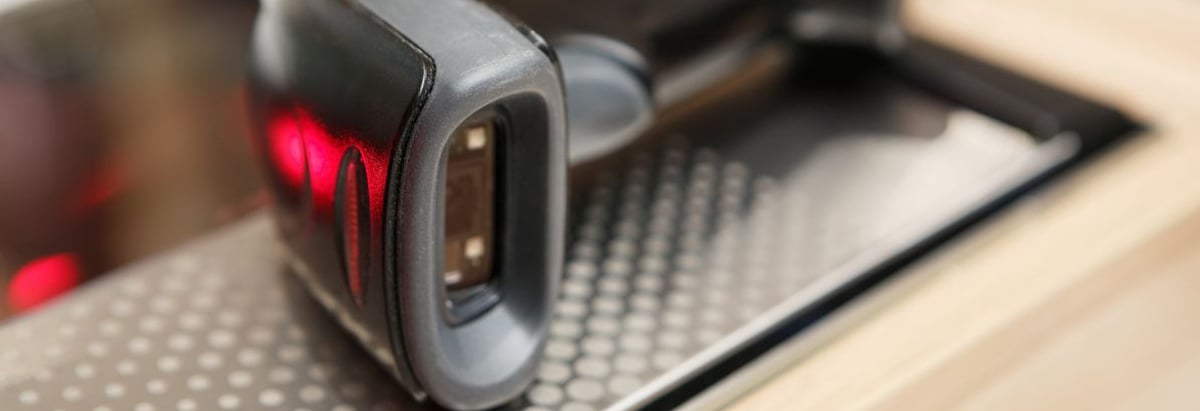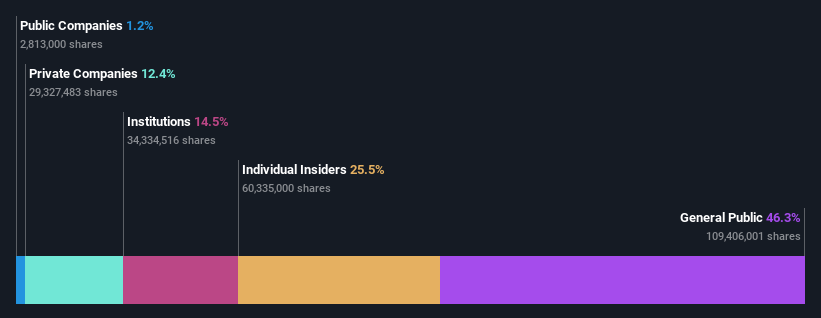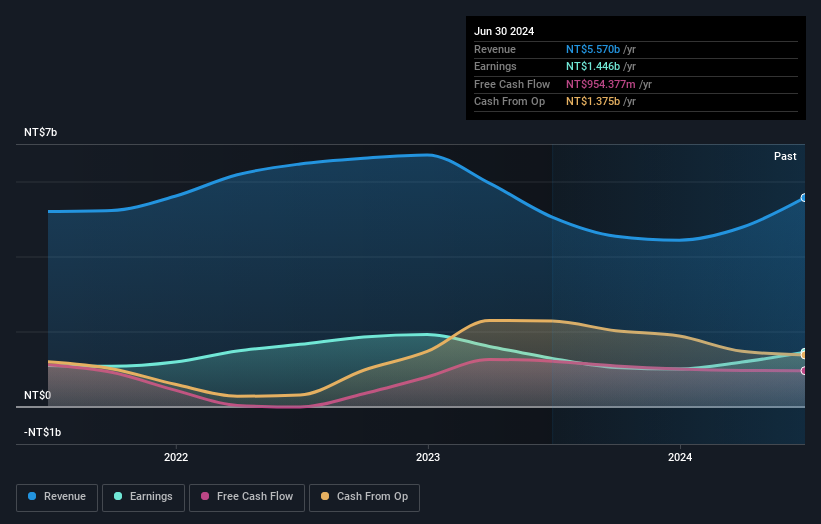- Taiwan
- /
- Electronic Equipment and Components
- /
- TWSE:3030
Test Research, Inc.'s (TWSE:3030) stock price dropped 12% last week; retail investors would not be happy

Key Insights
- The considerable ownership by retail investors in Test Research indicates that they collectively have a greater say in management and business strategy
- 50% of the business is held by the top 13 shareholders
- 26% of Test Research is held by insiders
To get a sense of who is truly in control of Test Research, Inc. (TWSE:3030), it is important to understand the ownership structure of the business. With 46% stake, retail investors possess the maximum shares in the company. Put another way, the group faces the maximum upside potential (or downside risk).
While the holdings of retail investors took a hit after last week’s 12% price drop, insiders with their 26% also suffered.
Let's delve deeper into each type of owner of Test Research, beginning with the chart below.
View our latest analysis for Test Research

What Does The Institutional Ownership Tell Us About Test Research?
Institutions typically measure themselves against a benchmark when reporting to their own investors, so they often become more enthusiastic about a stock once it's included in a major index. We would expect most companies to have some institutions on the register, especially if they are growing.
We can see that Test Research does have institutional investors; and they hold a good portion of the company's stock. This suggests some credibility amongst professional investors. But we can't rely on that fact alone since institutions make bad investments sometimes, just like everyone does. If multiple institutions change their view on a stock at the same time, you could see the share price drop fast. It's therefore worth looking at Test Research's earnings history below. Of course, the future is what really matters.

Hedge funds don't have many shares in Test Research. With a 23% stake, CEO Chieh-Yuan Chen is the largest shareholder. Dexin Investment Co., Ltd. is the second largest shareholder owning 6.7% of common stock, and Der Sheng Investment Co., Ltd. holds about 4.5% of the company stock.
After doing some more digging, we found that the top 13 have the combined ownership of 50% in the company, suggesting that no single shareholder has significant control over the company.
Researching institutional ownership is a good way to gauge and filter a stock's expected performance. The same can be achieved by studying analyst sentiments. We're not picking up on any analyst coverage of the stock at the moment, so the company is unlikely to be widely held.
Insider Ownership Of Test Research
The definition of an insider can differ slightly between different countries, but members of the board of directors always count. The company management answer to the board and the latter should represent the interests of shareholders. Notably, sometimes top-level managers are on the board themselves.
Most consider insider ownership a positive because it can indicate the board is well aligned with other shareholders. However, on some occasions too much power is concentrated within this group.
Our information suggests that insiders maintain a significant holding in Test Research, Inc.. It is very interesting to see that insiders have a meaningful NT$8.7b stake in this NT$34b business. Most would be pleased to see the board is investing alongside them. You may wish to access this free chart showing recent trading by insiders.
General Public Ownership
The general public-- including retail investors -- own 46% stake in the company, and hence can't easily be ignored. While this group can't necessarily call the shots, it can certainly have a real influence on how the company is run.
Private Company Ownership
We can see that Private Companies own 12%, of the shares on issue. It might be worth looking deeper into this. If related parties, such as insiders, have an interest in one of these private companies, that should be disclosed in the annual report. Private companies may also have a strategic interest in the company.
Next Steps:
I find it very interesting to look at who exactly owns a company. But to truly gain insight, we need to consider other information, too. Be aware that Test Research is showing 2 warning signs in our investment analysis , you should know about...
Of course this may not be the best stock to buy. Therefore, you may wish to see our free collection of interesting prospects boasting favorable financials.
NB: Figures in this article are calculated using data from the last twelve months, which refer to the 12-month period ending on the last date of the month the financial statement is dated. This may not be consistent with full year annual report figures.
Valuation is complex, but we're here to simplify it.
Discover if Test Research might be undervalued or overvalued with our detailed analysis, featuring fair value estimates, potential risks, dividends, insider trades, and its financial condition.
Access Free AnalysisHave feedback on this article? Concerned about the content? Get in touch with us directly. Alternatively, email editorial-team (at) simplywallst.com.
This article by Simply Wall St is general in nature. We provide commentary based on historical data and analyst forecasts only using an unbiased methodology and our articles are not intended to be financial advice. It does not constitute a recommendation to buy or sell any stock, and does not take account of your objectives, or your financial situation. We aim to bring you long-term focused analysis driven by fundamental data. Note that our analysis may not factor in the latest price-sensitive company announcements or qualitative material. Simply Wall St has no position in any stocks mentioned.
About TWSE:3030
Test Research
Designs, assembles, manufactures, sells, and maintains automated inspection and testing equipment in Asia, the United States, Europe, and internationally.
Flawless balance sheet with solid track record.


